The question of whether pet birds truly love their owners is a topic that resonates deeply with those who share their lives with these feathered companions.
While it’s clear that birds form strong bonds with their human caregivers, the nature of their affection and emotional connection might differ from that of traditional pets.
Understanding the signs of affection and attachment in birds requires delving into their behaviors, communication methods, and evolutionary traits.
By examining do pet birds love their owners, we can gain insights into the complex relationship between birds and their owners.
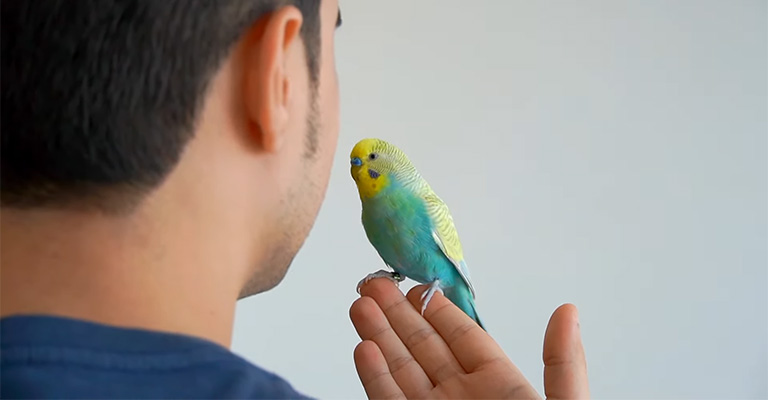
Do Pet Birds Love Their Owners?
Pet birds can love their owners in different ways, depending on their species, personality, and upbringing.
Here are the explanations of how pet birds can show their love to their owners:
Bonding
Pet birds can form strong bonds with their owners through positive interactions and regular care.
Some birds can also mimic their owners’ behavior and language, showing a level of affection and attachment. Bonding is based on mutual trust, understanding, and respect, allowing for a special relationship that goes beyond mere friendship.
Loyalty
Pet birds can be loyal to their owners, especially if they have been raised and cared for properly.
Some birds, such as parrots, are more loyal than dogs, as they only trust one person and are monogamous with one mate for life.
Loyalty is a sign of commitment and devotion, indicating that the bird values its owner above anyone else.
Cuddling
Pet birds can cuddle with their owners, either by snuggling up in their hand or lap or by rubbing their head or beak against them.
Cuddling is a way of expressing physical affection and comfort, showing that the bird enjoys being close to its owner and feels safe and secure with them.
Playing
Pet birds can play with their owners, either by engaging in games or toys or by performing tricks or antics.
Playing is a way of showing interest and curiosity, demonstrating that the bird finds its owner fun and stimulating.
Playing also helps to strengthen the bond between the bird and its owner, as they share positive experiences and learn from each other.
Singing
Pet birds can sing to their owners, either by imitating their voice or words or by creating their own melodies or tunes.
Singing is a way of communicating and expressing emotions, revealing that the bird wants to interact with its owner and share its feelings with them.
Singing also helps to soothe and calm the bird, as well as its owner.
Gifting
Pet birds can gift their owners, either by bringing them objects or food or by making them something with their own feathers or materials.
Gifting is a way of showing gratitude and generosity, indicating that the bird appreciates its owner and wants to please them.
Gifting also helps to establish trust and reciprocity between the bird and its owner as they exchange favors and rewards.
Grieving
Pet birds can grieve for their owners, either by becoming depressed or withdrawn or by displaying signs of distress or agitation.
Grieving is a way of coping with loss and sadness, proving that the bird loved its owner deeply and missed them terribly. Grieving also helps to honor the memory and legacy of the owner, as well as to heal and move on.
What Behaviors Make Pet Birds Love Their Owners?
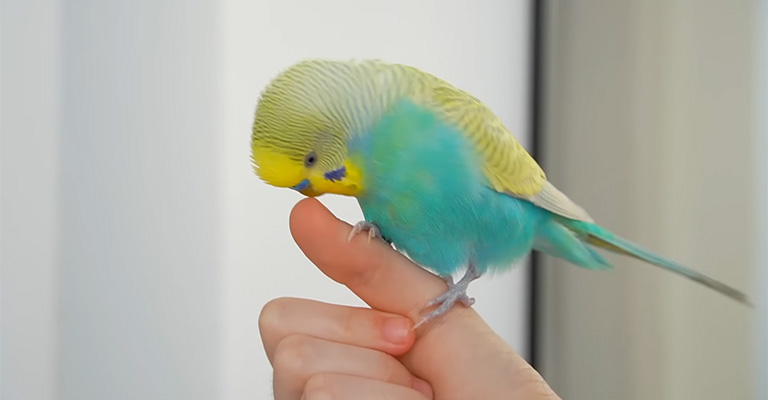
Building a strong bond between pet birds and their owners requires time, patience, and consistent positive interactions.
While individual bird personalities can vary widely, here are some interesting behaviors that can help foster a loving relationship between pet birds and their owners:
Social Interaction
Spend quality time with your bird every day. Engage in activities like talking, whistling, singing, and playing games.
Birds are highly social creatures that thrive on companionship, and your active involvement will make them feel valued.
Positive Reinforcement
Reward desirable behavior with treats, praise, or attention. When your bird follows commands, perches on your hand, or exhibits friendly behavior, acknowledge it with enthusiasm to reinforce their connection with you.
Gentle Handling
Approach your bird slowly and calmly, using gentle movements. Gradually build trust by allowing them to get used to your presence before attempting direct contact. Always handle them with care to avoid scaring or harming them.
Mimicking Vocalizations
Many pet birds, like parrots, enjoy mimicking human speech and sounds. Repeating phrases or words in a clear, soothing tone can make your bird feel more connected to you and encourage them to vocalize back.
Providing Mental Stimulation
Birds are intelligent creatures that require mental stimulation to stay engaged and happy. Offer a variety of toys, puzzles, and activities that challenge their problem-solving abilities, ensuring they stay mentally active.
Consistent Routine
Birds appreciate routine and predictability. Establish a consistent daily schedule for feeding, playtime, and social interactions. This helps your bird feel secure and comfortable in their environment.
Respect Personal Space
While social interaction is essential, it’s also crucial to respect your bird’s personal space. Allow them to approach you on their terms and avoid overwhelming them with too much physical contact.
Observing Body Language
Pay close attention to your bird’s body language. Learn to read their signals to determine when they’re comfortable, scared, or in need of attention. This sensitivity can help you adjust your interactions accordingly.
Avoid Negative Associations
Be mindful of anything that might create negative associations with you or your presence. Avoid sudden loud noises, sudden movements, or experiences that might cause fear or discomfort, as these can damage the trust you’ve built.
Remember, building a strong bond with a pet bird takes time and patience. Not all birds will exhibit the same behaviors, and some might be naturally more reserved or independent.
The key is to adapt your approach to your bird’s personality, preferences, and comfort levels while consistently demonstrating kindness and respect.
Over time, your efforts will likely lead to a rewarding and loving relationship between you and your feathered friend.
Which Birds Are The Most Friendly?
There are many bird species that can be friendly and affectionate pets, depending on their personality, upbringing, and care.
Here are some birds that are known for being some of the most friendly:
Cockatiel
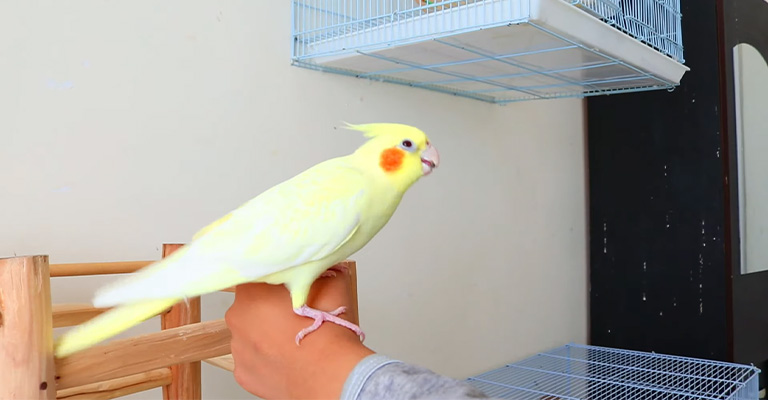
Cockatiels are small parrots that are very popular as pets. They are gentle, sociable, and intelligent and can bond well with their owners. They can also learn to whistle, mimic sounds, and perform tricks.
Budgerigar
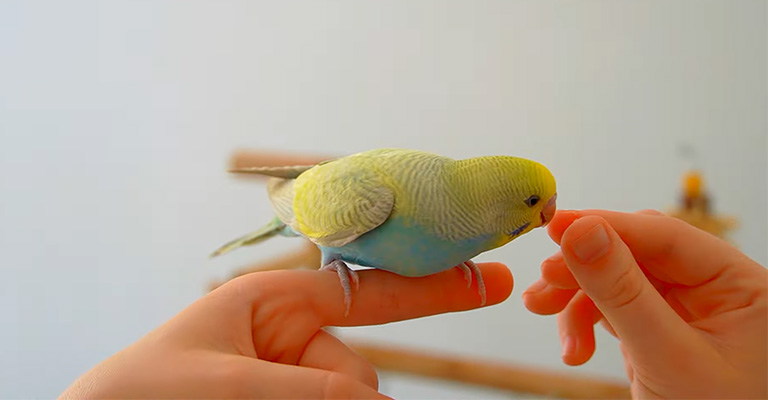
Budgerigars (or parakeets) are another small parrot species that are very friendly and playful.
They can be easily tamed and trained and can learn to talk and imitate noises. They also enjoy spending time with their owners and other birds.
Dove
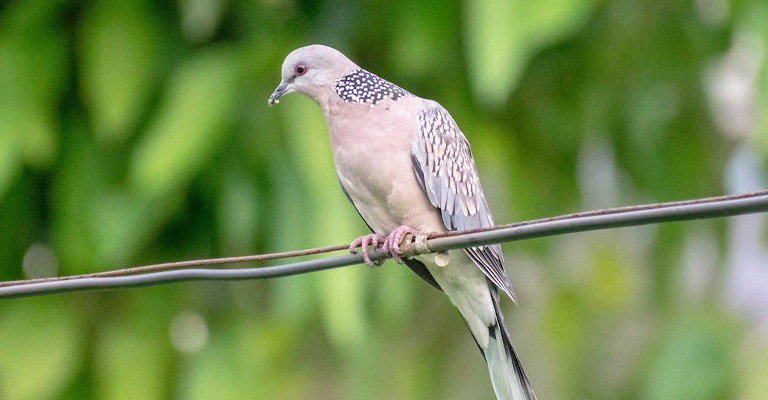
Doves are peaceful and quiet birds that make great pets for people who want a gentle and calm companion. They are easy to care for and handle and can show affection by cooing and snuggling with their owners.
Green-Cheeked Conure
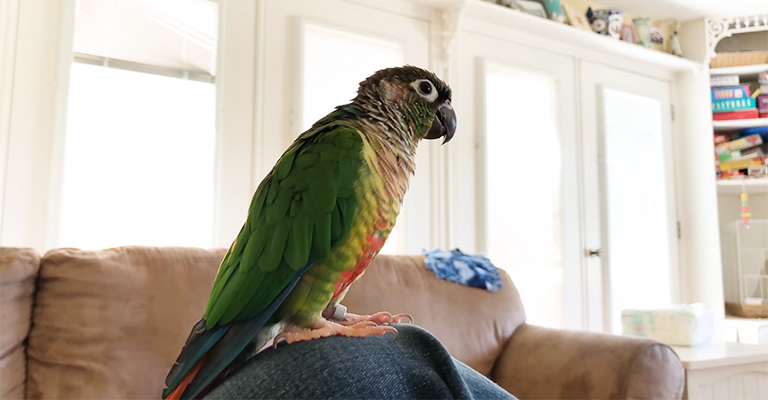
Green-cheeked conures are colorful and lively birds that have a lot of personality. They are very social and love to interact with their owners and other birds. They can also be trained to do tricks and say words.
Cockatoo:
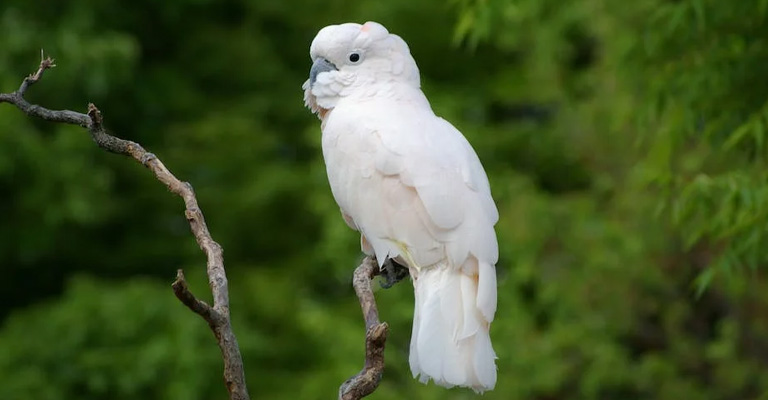
Cockatoos are large and beautiful birds that are very loyal and affectionate to their owners. They crave attention and cuddles and can form strong bonds with their human companions. They can also be very smart and learn to talk and mimic sounds.
Hyacinth Macaw
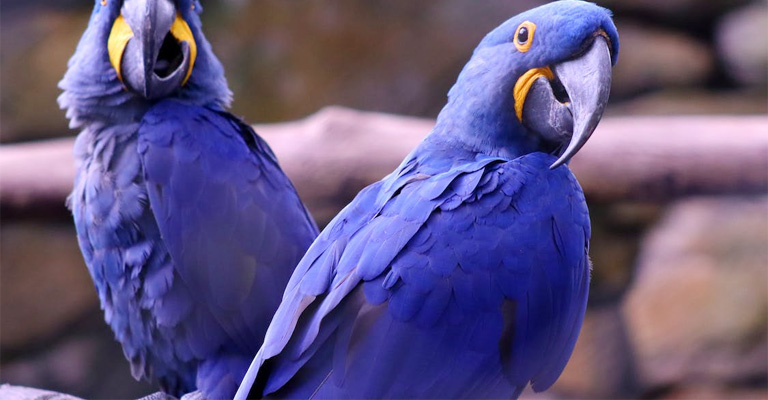
Hyacinth macaws are the largest of all parrots, but they are also very gentle and sweet-natured. They are very intelligent and can learn to communicate with their owners through words and gestures. They also need a lot of space, toys, and socialization to keep them happy.
Parrotlet
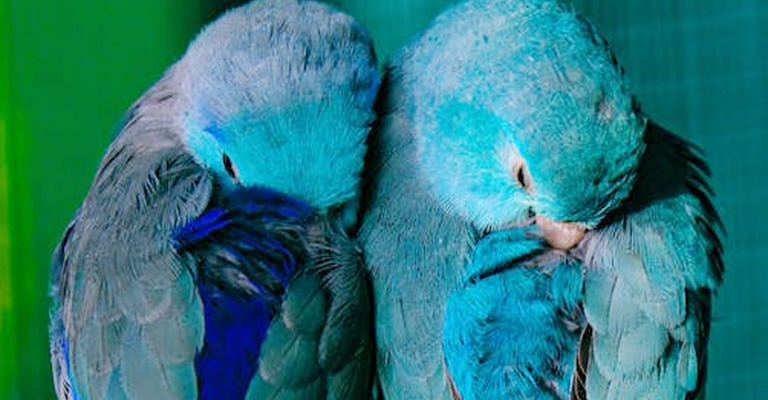
Parrotlets are the smallest of all parrots, but they have big personalities. They are very active, curious, and playful and can bond well with their owners.
They can also learn to talk and do tricks, but they can be a bit nippy if not handled properly.
African Grey Parrot
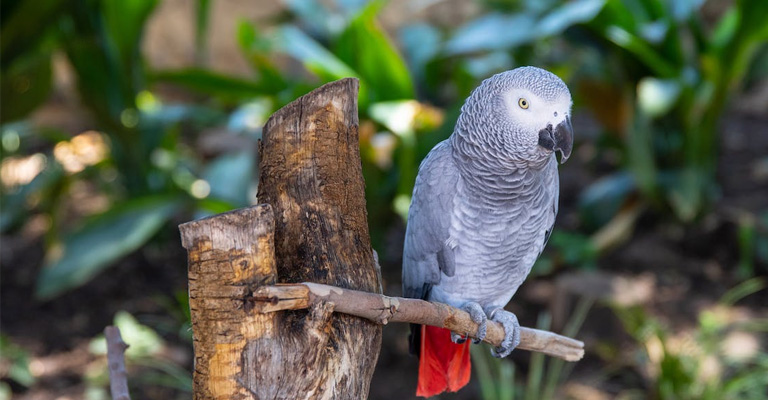
African grey parrots are considered to be one of the most intelligent bird species in the world.
They have amazing abilities to talk and mimic sounds, as well as understand concepts and emotions. They are very social and need a lot of attention and stimulation from their owners.
Finch
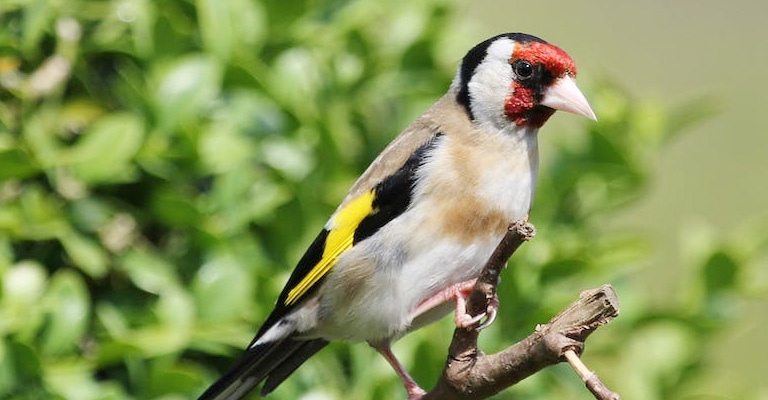
Finches are small and cheerful birds that make pleasant sounds and add beauty to any home.
They are not very tame or cuddly, but they can be friendly and enjoy the company of other finches. They are also easy to care for and do not require much interaction from their owners.
FAQ
Yes, pet birds can develop strong emotional bonds with their owners. Their social nature and ability to recognize familiar faces and voices allow them to form attachments, displaying affection through behaviors like singing, preening, and seeking interaction.
Absolutely, pet birds exhibit affection in various ways. They might perch on your shoulder, groom your hair, or snuggle against you.
Their body language, vocalizations, and responsiveness are indications of their attachment and positive feelings toward you.
Yes, various bird species have distinct behaviors when it comes to affection. Parrots might mimic speech or cuddle, while finches might sing or groom their mate’s feathers.
Understanding your specific bird’s natural behaviors will help you recognize their unique expressions of love.
Yes, pet birds can experience separation anxiety. They rely on the companionship and routine provided by their owners.
Sudden and prolonged separation can lead to stress, behavioral changes, and even health issues. Gradual introductions to alone time can help minimize distress.
Spending quality time together is essential. Engage in gentle handling, positive reinforcement, and interactive play. Provide mental stimulation with toys and puzzles, and be attuned to their body language.
Consistency, patience, and understanding of their needs will help nurture a loving relationship over time.
Conclusion
The concept of pet birds loving their owners is a complex interplay of behavior, biology, and the unique dynamics between species.
While it’s challenging to attribute human-like emotions to birds, it’s evident that these intelligent creatures form deep attachments to their caregivers.
Through attentive care, positive interactions, and a willingness to understand their unique needs, owners can undoubtedly cultivate affectionate relationships with their pet birds.
The genuine connections built over time, marked by trust, communication, and shared experiences, affirm that pet birds do, in their own remarkable way, love and appreciate the presence of their human companions.